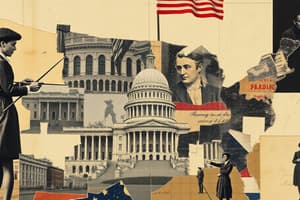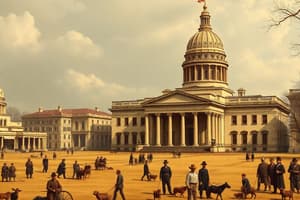Podcast
Questions and Answers
What are the three branches of government?
What are the three branches of government?
Legislative, Executive, Judicial
What are the rights and elements of participation of American citizens?
What are the rights and elements of participation of American citizens?
Voting, freedom of speech, freedom of assembly, and the right to petition the government.
What was life like on the Oregon Trail?
What was life like on the Oregon Trail?
Challenging and arduous, with many facing hardships like disease, harsh weather, and limited resources.
What is Manifest Destiny?
What is Manifest Destiny?
Why did war break out between the U.S. and Mexico?
Why did war break out between the U.S. and Mexico?
What are the basic principles of government set forth by the Constitution?
What are the basic principles of government set forth by the Constitution?
What kind of government was created by the Articles of Confederation? What weaknesses did it have?
What kind of government was created by the Articles of Confederation? What weaknesses did it have?
What were the first major outcomes of the first major battle of the war?
What were the first major outcomes of the first major battle of the war?
How did life change during the Civil War?
How did life change during the Civil War?
Flashcards are hidden until you start studying
Study Notes
Three Branches of Government
- Executive Branch: Enforces laws, led by the President.
- Legislative Branch: Makes laws, composed of Congress (House of Representatives and Senate).
- Judicial Branch: Interprets laws, includes the Supreme Court and lower courts.
Rights and Elements of Participation of American Citizens
- Voting: Citizens have the right to vote in elections; participation is essential for democracy.
- Freedom of Speech and Assembly: Citizens can express opinions and gather peacefully.
- Civic Duties: Responsibilities include serving on juries and paying taxes.
Life on the Oregon Trail
- Westward Expansion: Pioneers traveled approximately 2,170 miles from Missouri to Oregon in search of land and opportunity.
- Challenges: Covered wagon journeys faced harsh weather, disease, and food shortages.
- Social Dynamics: Diverse groups formed communities, sharing resources and experiences, fostering a spirit of cooperation.
Manifest Destiny
- Concept: The 19th-century belief that the U.S. was destined to expand across North America.
- Justification: Seen as a divine right, it fueled territorial expansion, including the annexation of Texas and the acquisition of Oregon.
U.S.-Mexico War Causes
- Territorial Disputes: Tensions escalated over annexation of Texas and border disagreements.
- American Expansionism: Desire for more land and resources was a driving factor for conflict.
- Diplomatic Failures: Attempts to negotiate failed, leading to military engagement.
Basic Principles of Government in the Constitution
- Separation of Powers: Divides government responsibilities among the three branches.
- Checks and Balances: Each branch can limit the powers of the others, preventing abuse of power.
- Federalism: Division of power between national and state governments.
Government under the Articles of Confederation
- Structure: A loose confederation of states with a weak central government.
- Weaknesses: Lacked authority to levy taxes, regulate commerce, or enforce laws; hindered effective governance and national unity.
Initial Outcomes of the First Major Battle of the War
- Battle of Bull Run: First significant battle in the Civil War, fought in 1861.
- Confederate Victory: Boosted Southern morale and showcased the war's potential length and cost.
- Military Realization: Highlighted the need for better training and organization on both sides.
Changes During the Civil War
- Social Impact: Women took on new roles, managing businesses and farms; nursing became a prominent occupation for women.
- Economic Changes: Industries expanded to support war efforts; the agricultural economy in the South suffered due to blockades and destruction.
- Political Transformation: The government increased its power and efficiency in mobilizing resources and managing the war effort.
Studying That Suits You
Use AI to generate personalized quizzes and flashcards to suit your learning preferences.




